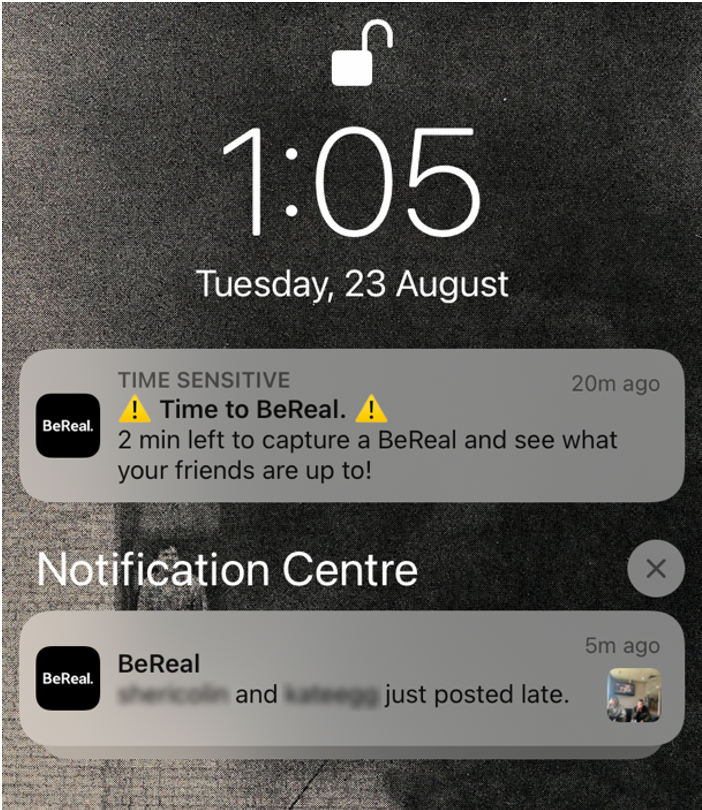BeReal: an uncertain future, so enjoy it while it lasts
- Denby Weller
- Sep 17, 2022
- 3 min read
A photo of a friend wearing their reading glasses at dinner eating soup. Another with a mask on, waiting for their clothes to dry at the laundromat. Someone else’s feet standing at an intersection accompanied by a blurry selfie of themselves rugged up against the cold.
This may sound like a compilation of uneventful everyday moments, but recently it’s better known as regular content from the current No.1 app in Australia.
BeReal, an image-sharing platform founded by former GoPro employee Alexis Barreyat, is reminiscent of the early days of social media.
It isn’t designed to be used regularly, there are no ads or subscription fees, and it is anti-influencer. Users only post once a day, and only friends see the post. The app gives an alert at a random time, and then the user then has two minutes to take and post a “dual” picture – both front and back cameras on the phone go off at the same time. No filters or other image edits are allowed.

A series of screenshots from the BeReal app. Picture by Rachel S. Hunt/The Diamondback
It’s an oasis in the current desert of recommended posts and short-form videos that are increasingly irritating users: a change.org petition, for example, pleaded for Instagram to “Stop trying to be TikTok” has amassed more than 310,000 signatures.
Melbourne-based agency Media33 business manager Sam Burke is downbeat about BeReal’s commercialism-free future.
“They’ll either be bought out by another tech company or introduce ads once they have enough users,” he says.
BeReal is currently reliant on capital funding to operate and is valued at USD$600 million. It has nearly 22 million active users per month after seeing a more than 1000% increase in downloads throughout 2022, according to data from Business Of Apps. Naturally, some marketing companies are scrambling to commodify these numbers.

Once a day at a specific time, users rare given a two-minute window to “BeReal”, with late posters flagged.
US fast-food restaurant Chipotle uses the platform to advertise unique promotions that are often redeemed within minutes, Fast Company reports.
Burke, however, says his agency currently isn’t interested in using the platform.
“Considering it’s sort of ‘anti-Instagram’, it would be difficult to make effective content for our clients … It’s too new and too risky,” he says.
“People nowadays do want authentic content … younger generations particularly are able to see through traditional advertising.”
Melbourne University student Annick Paterson, 21, is disdainful of Instagram’s recommended content and constant ads. A self-described BeReal “fiend”, she says she would be turned off BeReal if it introduced anything similar.
“I like that, at the moment anyway, there’s none of that on BeReal. It just feels a bit nicer – a bit more pure. The point of having the app is just to have it with your close friends.”
Another scenario is already unfolding that could see the refuge BeReal is providing pillaged.
Meta, the tech giant that owns Instagram, is quietly incorporating BeReal’s distinctive characteristics into its app. The company has already introduced a “dual” photo feature, which takes a simultaneous picture from a user’s front and rear cameras: a key component of BeReal’s user interface.
Mobile developer Alessandro Paluzzi, leaked information to Twitter about a feature Instagram is working on dubbed ‘Candid Challenges’, which copies BeReal’s two-minute posting window.
#Instagram is working on IG Candid Challenges, a feature inspired by @BeReal_App 👀 ℹ️ Add other's IG Candid to your story tray. And everyday at a different time, get a notification to capture and share a Photo in 2 Minutes. pic.twitter.com/caTCgUPtEV — Alessandro Paluzzi (@alex193a) August 22, 2022
Engagenet quoted an Instagram spokesperson saying it was currently an “internal prototype”.
This is perhaps unsurprising considering Meta’s history of taking other app’s ideas and disseminating them to their billions of users to sterilise their competition: “stories” from Snapchat, “messenger rooms” inspired by Zoom, and “reels” from TikTok, as time-lined by Business Insider.
With an air of exasperated disappointment, Annick Paterson acknowledges that she expected this.
“For the meantime, it’s fun,” she said.












Comments